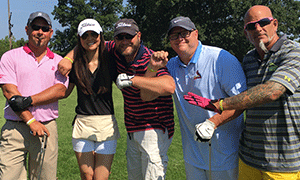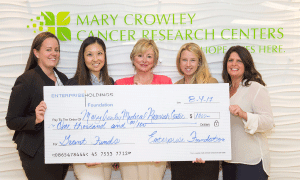Here Today, Gone Tomorrow?
“Here Today, Gone Tomorrow” are lyrics written by composer Ray Conniff in 1973, but could he have been thinking of what happens to the target after targeted therapy for mutated cancers? If so, was he “right on target”?
Cancers, specifically solid tumors, are defined by their mutational fingerprints that differentiate them from their normal tissue counterparts, e.g., lung cancer cells vs. healthy lung cells. A small percentage of these mutations are called drivers. They modify the functionality of the cancer cells resulting in a rewired signal transmission system within the cells; this gives cancer cells an adaptive edge as compared with their normal cell counterparts. Many of these driver genes produce unique proteins called receptors that can be targeted by tumor-specific/selective therapy. These receptors reside on the surface of the cancer cells and, when stimulated by “growth factors,” transmit signals through a series of proteins inside the cells (i.e., signal pathways) that deliver instructions to genes in the nucleus which can then enhance cell growth, protect from cell death or increase cell mobility allowing them to spread beyond their normal confines (i.e., metastasize). So, by targeting the receptors or key proteins in their downstream pathways, we can selectively kill cancer cells and minimize damage to normal ones. Voila! That is targeted (or precision) therapy.
Sounds good. Unfortunately, the targeted cancer cells being treated with cancer- and patient-specific targeted therapy can be intrinsically resistant or develop adaptive resistance to treatment. Intrinsic (initial) resistance occurs if the mutation does not result from a driver or is not sensitive to the therapeutic agent. The mutated surface protein persists, and the targeted therapy does not effectively kill the cancer.
In cancers that initially respond to the targeting therapeutic, adaptive resistance can occur by a number of different mechanisms. There can be multiple subpopulations of cancer cells in the same tumor site or at metastatic tumor sites, (intra-tumor or inter-tumor heterogeneity, respectively) with different or additional driver mutations. As a result, following treatment failure, the mutated proteins will no longer be present but the cancer will be able to survive. On the other hand, the initially sensitive cancer cell can further mutate and develop a second treatment-resistant mutation in the same protein. In this case, the initial mutant protein may or may not persist.
So, what happens to the target? To paraphrase the Beatles,it’s “Here, there and everywhere” or nowhere!
Neil Senzer, M.D. (2017)
Read article: Targeted Therapeutics: Personalized Medicine at Mary Crowley.
IN THE CLINIC
By Guest Contributor Britney Nuckolls, Clinical Research Coordinator
Mary Crowley offers multiple classifications of clinical trials for qualified patients with all types of solid tumor cancers.
Targeted Therapy
The human body is comprised of over 30,000 genes. Mary Crowley obtains a molecular profile for each patient that reveals the genomic mutations in their individual tumor sample. This personalized information enables our study team to match the cancer-causing mutations to one of our 22 targeted therapies. A targeted therapy is designed to identify the cancer mutations and then block their growth pathway.
Antibody Drug Conjugate Therapy
Certain therapies are designed to act like “smart bombs,” targeting a cancer site and destroying the invading cancer cells. Called “Antibody Drug conjugate” trials, these therapies are like military drones that target specific cancer cells, as opposed to chemotherapy which affects both normal and cancer cells. Mary Crowley’s “arsenal” includes 11 “Antibody Drug conjugate” clinical trials.
Immunotherapy
Mary Crowley offers 28 immunotherapy trials, two of which are exclusive to Mary Crowley. These are personalized immunotherapies in which a portion of the patient’s tumor cells are used to manufacture a vaccine that, when given to the patient, causes the immune system to recognize the cancer as foreign and begin to fight it.
To learn more about Mary Crowley’s Innovative Clinical Trials.
An Important First for the Cancer Community: FDA Approves First Cancer Treatment for Any Solid Tumor Based on Biomarker
On May 23, 2017, the Federal Drug Administration (FDA) granted accelerated approval to a treatment for patients whose cancers have a specific genetic feature or biomarker. This is the first time the FDA has approved a cancer treatment based on a common biomarker rather than the location in the body where the tumor originated.
“We are excited to see the industry moving in our direction,” said John Nemunaitis, Mary Crowley Executive Medical Director. “For over twenty years, Mary Crowley Cancer Research has been aligning patients with the newest discoveries in PERSONALIZED targeted gene and immune therapies. We examine the molecular profile of each individual patient and match them to clinical trials that address the mutations of their specific tumor. While Mary Crowley did not participate directly in clinical trials that led to this approval, the FDA’s approval of Keytruda (pembrolizumab) based on biomarker validates the science we have been pursuing since our inception.”
“This is an important first for the cancer community,” said Richard Pazdur, M.D., acting director of the Office of Hematology and Oncology Products in the FDA’s Center for Drug Evaluation and Research and director of the FDA’s Oncology Center of Excellence. “Until now, the FDA has approved cancer treatments based on where in the body the cancer started – for example, lung or breast cancers. We have now approved a drug based on a tumor’s biomarker without regard to the tumor’s original location.”
Keytruda works by targeting the cellular pathway known as PD-1/PD-L1 (proteins found on the body’s immune cells and some cancer cells). By blocking this pathway, Keytruda may help the body’s immune system fight the cancer cells. The FDA previously approved Keytruda for the treatment of certain patients with various cancer types.
For more information, visit www.fda.gov.
Mary Crowley Recognized as Center of Excellence
 QuintilesIMS, a global Contract Research Organization, has awarded Mary Crowley with an Achievement of Excellence Certificate in recognition of our contribution and commitment to the highest standards of clinical research.
QuintilesIMS, a global Contract Research Organization, has awarded Mary Crowley with an Achievement of Excellence Certificate in recognition of our contribution and commitment to the highest standards of clinical research.
In a joint statement, Ralph Moussali, Vice President of Global Head of Site and Patient Networks and Jeffrey Spaeder, M.D., SVP and Chief Medical and Scientific Officer said:
“In recognition of superior performance and quality in clinical research, QuintilesIMS recognizes Mary Crowley Cancer Research and offers our gratitude for your valuable contributions as a preferred site of QuintilesIMS to help deliver new treatment options that improve the lives of patients around the world.”
Angela Ebel, Mary Crowley Vice President of Research Operations, responded, “Mary Crowley is honored to receive recognition for maintaining the highest quality of research and patient care. Our team strives for excellence because facilitating access to innovative new drugs gives HOPE to cancer patients.”
Pushing Hope 2017
Commemorating its sixth year of launching BIG HOPE 1, Ceres Consulting LLC “pushed” another successful pink event for the inland marine industry on August 17-20th, 2017 in Kirkwood, Missouri. The purpose of the event was to bring together like companies and friends from the area who share a common goal of raising cancer awareness and dollars to advance cancer research.
Over fifty underwriters sponsored the annual golf, kickball and softball tournaments, collectively raising $149,000 to support the clinical trial program at Mary Crowley Cancer Research. Since 2012, the marine industry has raised over $861,000 for Mary Crowley Cancer Research. 100% of the funds donated have gone directly to advanced cancer patients needing access to the newest cancer therapies through clinical trials. We are deeply grateful to Ceres Consulting LLC and the many companies and individuals who have joined us in the fight against cancer to PUSH HOPE to cancer patients.

Mark Mestemacher, Eunice Kuo, Pat Brown, Lisa Mareschal and Mark Fletcher

Eunice Kuo with golfers displaying their Mary Crowley & Pushing Hope Bracelets
Teaming Up for a Cure Gives $15K to Fight Ewing Sarcoma
In 2015, Gunner Miller, a high school sophomore, felt an unusual pain in his leg. When the pain persisted, doctors diagnosed him with Ewing sarcoma, a rare bone cancer that typically affects teenagers. Chemotherapy forced Gunner to skip football season, which was especially disappointing since his father Jim Miller is Rockdale High School Head Coach.
Gunner’s mother Angel Miller and friend Kelly Pickel, whose son lost his battle with cancer at age 3, decided they could not sit on the sidelines in the fight against childhood cancer. They established “Teaming Up for a Cure Foundation” and sold t-shirts at Rockdale home football games to raise funds for research. Other Texas schools sold t-shirts to raise funds at their games as well. In 2016 over 30 high schools participated in selling the t-shirts, and collectively they raised over $30,000.
Gunner’s cancer responded to chemotherapy, and he is currently in remission. In August 2017, the Miller Family traveled to Dallas to present a check in the amount of $15,000 toward Ewing sarcoma research at Mary Crowley Cancer Research. Mary Crowley conducts Phase I and II clinical trials for Ewing sarcoma.

Eunice Kuo (Mary Crowley Development Coordinator); Angel Miller and Gunner Miller. Not pictured is Jeff Miller, Gunner’s father.
The Enterprise Holdings Foundation donated $1000 to Mary Crowley Cancer Research.
Enterprise employee Kaytlyn Mount nominated Mary Crowley at the request of Enterprise customer Michelle Stevenson, whose husband Paul was enrolled on a clinical trial at Mary Crowley.

Kaytlyn Mount (Enterprise Daily Area Rental Manager), Eunice Kuo (Mary Crowley Development Coordinator), Pat Brown (Mary Crowley COO), Bailey Ernst (Enterprise Branch Manager) and Michelle Stevenson (Sewell Lexus)
 Thanks to your generosity, Mary Crowley Cancer Research received $5,682 on North Texas Giving Day, September 14, 2017. The Communities Foundation of Texas coordinated the 9th annual day of giving for nonprofits across North Texas. Funds given to Mary Crowley Cancer Research will go directly to patients in need of clinical trials. Your gift turns HOPE into LIFE for cancer patients at Mary Crowley!
Thanks to your generosity, Mary Crowley Cancer Research received $5,682 on North Texas Giving Day, September 14, 2017. The Communities Foundation of Texas coordinated the 9th annual day of giving for nonprofits across North Texas. Funds given to Mary Crowley Cancer Research will go directly to patients in need of clinical trials. Your gift turns HOPE into LIFE for cancer patients at Mary Crowley!
“The spirit of giving is like fire. It spreads faster and faster, once we let it catch on. But we must each do our part, and as scripture says, ‘God will open the windows of heaven and pour out blessings until there is no more need.’”
Patient Story: Kris Southward
“Where do we go from here?” Kris Southward asked this question five years ago, as he began his journey with stage IV colon cancer. The future looked bleak.
A CPA in Abilene, TX, Kris was accustomed to extra pressure during tax season. In May 2012, at the age of 49, he attributed his nagging stomach pain to stress. But the pain persisted into summer, and Kris scheduled a routine colonoscopy. To his shock, he awoke from the procedure to hear the doctor say, “I am sorry, you have cancer.” Later a biopsy revealed the cancer had spread to his liver.
Kris’ oncologist offered grim statistics: most patients with advanced colon cancer do not survive five years; with surgery and chemo, two year survival was the best expected outcome. That prognosis was staggering to Kris, who envisioned many more years with his wife Karen, their three daughters, and his one-year old grandson Ryder. His oncologist recommended a clinical trial at Mary Crowley Cancer Research, “to offer Kris as many weapons as possible to fight the cancer.”
Kris came to Mary Crowley and discovered that he qualified for a first-in-human trial of a personalized immunotherapy that is designed to engage one’s immune system to recognize and fight the cancer. Kris agreed to participate in a combination chemo-immune therapy trial. While there was no guarantee of success, Kris was relieved to have a glimmer of HOPE.
From November 2012 until May 2013, twice a month he received doses of chemotherapy. In addition, from November 2012 until September 2013, he received a monthly dose of his vaccine made from his own tumor tissue. He continued going to appointments with his primary oncologist, and he consistently felt well enough to work a normal schedule -- even through tax season.
“It gave me tremendous HOPE that Mary Crowley would take me as a patient… Everyone was genuine, up-front, and positive; I always felt welcome,” Kris says. In addition to seeking a positive outcome for himself, Kris felt good about participating in a trial to help other cancer patients find alternatives to harsh chemotherapy.
Kris’ cancer responded to the treatment, and year after year his scans remained clear. At his five-year check-up in July 2017, Kris received great news: he is still CANCER-FREE. Kris reflects, “In many ways five years has flown by. I have been blessed tremendously by so many people and am thankful to God for giving me these extra years… I am so grateful to everyone at Mary Crowley for all they did for me!”
Now when Kris asks “Where do we go from here?” the future looks bright indeed.
Give HOPE to cancer patients like Kris. Donate Today!



